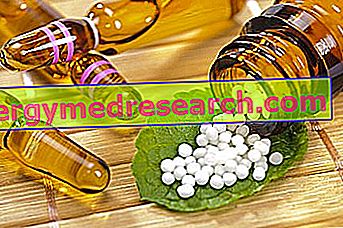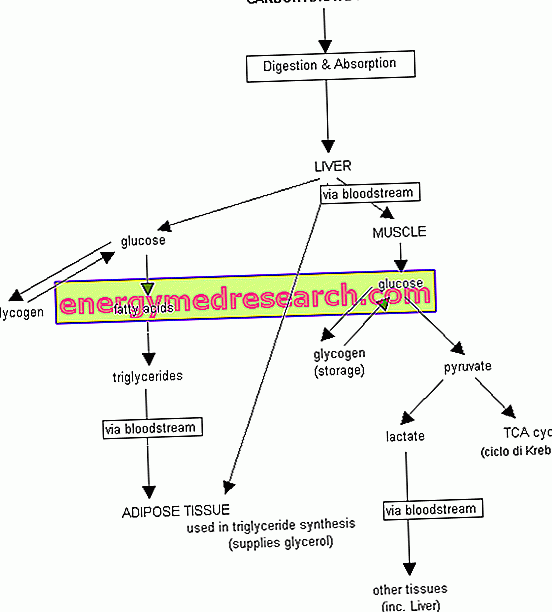The supplements of mineral salts are among the few products of the category to be universally accepted as useful substances for athletes. However, this statement is valid only if the physical activity is carried out under specific conditions.

Even more important are the environmental factors since the losses of mineral salts increase considerably when sports are practiced in hot-humid environments. A liter of sweat, for example, contains about 1.5 grams of salt and it is not at all strange that an athlete loses from 1 to 5 liters due to intense sweating (about 3l / h in case of intense physical activity performed in particularly hot environments).
A workout that lasts for three or four hours can cause sodium chloride losses in the order of 8-15 grams. Considering that the normal diet provides "only" 6-10 grams of salt, it is understandable that in similar situations it is particularly important to use saline supplements.
The most important minerals are chlorine and in particular sodium and potassium which work together in our body to regulate the osmolarity of intracellular and extra-cellular fluids.
If the increased sodium requirement can be covered simply by salting the food more than usual or adding a pinch of salt in the water bottles, increasing the intake of potassium and magnesium with the diet is not so simple. The intake is in fact close to the recommended minimum levels and may become insufficient due to intense sporting activity.
A chronic depletion of these mineral salts can lead to a reduction in performance up to cause important symptoms such as: muscle fatigue, nausea, muscle tremors, cramps and cardiovascular collapse.
The supplements of mineral salts do not serve "to make you go stronger" but "to ensure an adequate supply of these substances" in conditions of particularly long and intense physical effort
Sodium
Food sources | Salt (NaCl) milk, cheese, meat, eggs, etc. |
Functions |
|
Deficiency symptoms | Hyponatremia is rather rare and occurs, outside certain pathological conditions, in the case of extreme sweating not accompanied by adequate restoration of lost mineral salts. |
Symptoms of excess | Hypertension |
Daily requirement | 2000- 3000 mg |
Potassium
Food sources | Fresh fruits and vegetables (not preserved), meat, milk, legumes, cereals |
Functions |
|
Deficiency symptoms | Rare, only in the case of excessive losses due to gastrointestinal (vomiting, diarrhea) or urinary (diuretics); includes neuromuscular fatigue and cardiac changes |
Symptoms of excess | Ventricular fibrillation and cardiac arrest |
Daily requirement | 3100 mg |
Chlorine
Food sources | Salt (NaCl) |
Functions |
|
Deficiency symptoms | Rare, only in case of excessive gastroenteric leakage (vomiting, diarrhea) Loss of appetite, muscle cramps |
Symptoms of excess | very rare |
Daily requirement | 2000 - 5000 mg |
Some advices
First take care of the diet by consuming at least five portions of vegetables and fresh vegetables a day
don't worry about the amount of sodium contained in the water you drink. A sportsman, especially in the summer period, in fact needs mineralized waters which, unlike oligomineral ones (often improperly recommended to fight water retention and cellulite) ensure a fair supply of mineral salts and avoid the risk of hyponatremia (or hyposodemia: reduced blood sodium concentration)
in the race or during an intense physical training it is very important to keep yourself well hydrated by drinking a lot of water, however it is good not to overdo it. The risk of hyponatremia is in fact high if you take a lot of fluids during the competition; this risk can be significantly lowered if small quantities of sodium are added to the water (about one gram of salt per liter)
It is wrong to avoid drinking because of the fear of sweating excessively (sweating is essential for regulating body temperature) or getting fat (water does not supply calories)
To be quickly absorbed, the water must be moderately chilled (about 10 ° C), it must not be hyperosmolar (so be careful not to overdo it with the addition of mineral salts) but isotonic (ie similar to the saline concentration of the cells) and must contain minimal amounts of carbohydrates (5-8%, but less than 10%). For the same reason it is good to respect the doses of intake that are usually indicated on the packages.
At the end of a race or a particularly intense physical effort you can take advantage of the consumption of mineralized water (fixed residue of about 1 g / l), bicarbonate-alkaline-earthy, both to replenish the loss of liquids and mineral salts due to sweating, both to favor the elimination of nitrogenous waste and correct the acidosis caused by muscle fatigue (remember that the main alkalizing foods in order of power are: figs, dried apricots, spinach, dates, beets, carrots, celery, pineapple, tomatoes, cherries, bananas, oranges)
Do not dress with insulating clothes that do not allow the evaporation of sweat: this expedient does not help to lose weight and subjects the body to unnecessary stress (the risk of dehydration becomes high).
In the section on nutrition you can find all the information on the individual mineral salts (biological role, absorption, food sources and symptoms of deficiency or excess).
See also: Vitamin supplements



